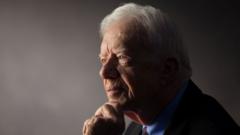In the realm of American politics, the shadows of past presidencies often loom large. As former US President Jimmy Carter's recent passing echoes through the nation, we are reminded of the multifaceted challenges he faced during his tenure and how they resonate closely with those confronting President Joe Biden today.
Though over four decades separate their presidencies, the specter of crises continues to haunt American leadership. During Carter's term, the United States wrestled with an economic crisis characterized by soaring inflation, energy shortages, and waning faith in government authority. As we glance into 2024, parallels can be drawn: Biden navigates a similarly turbulent economic landscape, exacerbated by global conflicts and the pressing threat of climate change.
Carter's diplomatic success at Camp David in 1978 symbolized hope for peace in the Middle East but was contrasted starkly by the Iranian hostage situation, a harrowing reminder of American impotence on the world stage. Similarly, Biden's administration faced the fallout of a disorganized exit from Afghanistan and recent escalations between Israel and Hamas, illustrating the complexity of international relations that both men grappled with during their respective times.
While Carter's hesitance to confront the Soviet invasion of Afghanistan invited criticism, Biden has, conversely, successfully marshaled a coalition to counter Russian aggression in Ukraine. Yet the aftermath of such conflicts often breeds discontent at home. Public faith in the government has consistently been a litmus test for each president's effectiveness, with Carter's approval ratings reflecting a profound crisis of confidence that still resonates today as Biden faces his own plummeting popularity amid inflation and ongoing global challenges.
In an ever-evolving political landscape, the relationship with China offers another striking reminder of how decisions made decades ago create repercussions today. Carter’s normalization of relations with China in 1979 ushered in an era of economic and military ascendance for the nation, a scenario Biden must now navigate amid increased competitive rivalry.
Environmental crises were equally pressing during the late 1970s, as energy shortages highlighted America's dependence on foreign oil; Biden now deals with the equally daunting and unprecedented challenges posed by climate change. Still, Carter’s initial policies promoting conservation and renewable energy are echoed in recent legislation spearheaded by Biden, reflecting how earlier governance principles continue to shape contemporary policy.
Both leaders confronted a maelstrom of domestic challenges, from waning trust in government institutions to being relegated to the sidelines in resolving international disputes. Carter openly addressed this crisis of confidence, emphasizing the need for unity and faith in democracy. Yet, the ensuing decades have witnessed a persistent erosion of public trust, with contemporary figures like Trump capitalizing on that sentiment to further political agendas.
In closing, Jimmy Carter's legacy stands as a historical mirror reflecting the hurdles faced by leaders in different eras. As Biden continues to navigate similar waters, the lessons learned from Carter's presidency may offer both warnings and inspiration for weathering modern challenges. While the political climate inevitably shifts, the fundamental struggle for American leaders to inspire trust and effect meaningful change seems timeless.
Though over four decades separate their presidencies, the specter of crises continues to haunt American leadership. During Carter's term, the United States wrestled with an economic crisis characterized by soaring inflation, energy shortages, and waning faith in government authority. As we glance into 2024, parallels can be drawn: Biden navigates a similarly turbulent economic landscape, exacerbated by global conflicts and the pressing threat of climate change.
Carter's diplomatic success at Camp David in 1978 symbolized hope for peace in the Middle East but was contrasted starkly by the Iranian hostage situation, a harrowing reminder of American impotence on the world stage. Similarly, Biden's administration faced the fallout of a disorganized exit from Afghanistan and recent escalations between Israel and Hamas, illustrating the complexity of international relations that both men grappled with during their respective times.
While Carter's hesitance to confront the Soviet invasion of Afghanistan invited criticism, Biden has, conversely, successfully marshaled a coalition to counter Russian aggression in Ukraine. Yet the aftermath of such conflicts often breeds discontent at home. Public faith in the government has consistently been a litmus test for each president's effectiveness, with Carter's approval ratings reflecting a profound crisis of confidence that still resonates today as Biden faces his own plummeting popularity amid inflation and ongoing global challenges.
In an ever-evolving political landscape, the relationship with China offers another striking reminder of how decisions made decades ago create repercussions today. Carter’s normalization of relations with China in 1979 ushered in an era of economic and military ascendance for the nation, a scenario Biden must now navigate amid increased competitive rivalry.
Environmental crises were equally pressing during the late 1970s, as energy shortages highlighted America's dependence on foreign oil; Biden now deals with the equally daunting and unprecedented challenges posed by climate change. Still, Carter’s initial policies promoting conservation and renewable energy are echoed in recent legislation spearheaded by Biden, reflecting how earlier governance principles continue to shape contemporary policy.
Both leaders confronted a maelstrom of domestic challenges, from waning trust in government institutions to being relegated to the sidelines in resolving international disputes. Carter openly addressed this crisis of confidence, emphasizing the need for unity and faith in democracy. Yet, the ensuing decades have witnessed a persistent erosion of public trust, with contemporary figures like Trump capitalizing on that sentiment to further political agendas.
In closing, Jimmy Carter's legacy stands as a historical mirror reflecting the hurdles faced by leaders in different eras. As Biden continues to navigate similar waters, the lessons learned from Carter's presidency may offer both warnings and inspiration for weathering modern challenges. While the political climate inevitably shifts, the fundamental struggle for American leaders to inspire trust and effect meaningful change seems timeless.

















